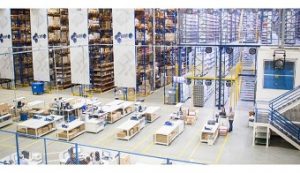
As global demand for produced goods continues to climb, manufacturing organisations are facing new challenges in meeting customer demand and elevated safety concerns along the supply chain due to a backlog of goods in transit.
New technology offered by smart cameras can help to alleviate some of these pain points by providing an entirely new way of monitoring and controlling safety measures and optimising operations within manufacturing plants – benefiting both businesses and customers.
While specialised smart cameras have been in use for production monitoring in large facilities for the past few years, a new generation of smart cameras is helping smaller manufacturing organisations to more efficiently manage day-to-day operations, ensure compliance with workplace safety measures and detect production floor stoppages.
These cameras, which operate on an open platform from Security & Safety Things (S&ST), are equipped with Artificial Intelligence infused video analytics and are capable of running a variety of different apps from an Application Store, much like a smartphone. With nearly 100 apps that address a growing variety of use cases, these smart cameras are easy to deploy and can very quickly detect issues that often go unseen by the human eye but may have an impact on operational efficiency and overall customer experience.
“The value of a smart camera is in its versatility to both monitor and document proper production and the handling and transportation of goods, while simultaneously contributing to customer experience,” said Anton Wintersteller, Senior Business Development Manager, Security & Safety Things. “Smart cameras equipped with AI-enabled applications are becoming part of the tool kit for manufacturing facilities in looking for new and innovative ways to improve operations.”
Employee safety and security is top of mind for manufacturing and logistic facilities, with a constant threat of danger from machinery malfunctions and other accidents. Video analytics can help ensure compliance with safety rules, such as proper use of machines, compliance with safety regulations and the wearing of proper protection equipment. Smart camera solutions can monitor whether employees are wearing safety clothing, through the identification of hardhats, high visibility vests, work goggles and required footwear.
Additionally, these cameras can assist in the detection and notification of proper personnel when individuals enter safety zones around big machinery, or other hazardous areas. They can assess levels of smoke and steam in closed rooms and other areas. By monitoring for potential slips, falls or other injuries, they can more quickly raise alerts – as well as detect precursors of potential incidents, such as smoke and fire coming from machinery.
Smart cameras play an important role in fire and safety prevention, through the early detection of flames, smoke or spills in large commercial buildings. As warehouses and manufacturing facilities become less populated through the implementation of automation technology, smart surveillance will play a crucial role in the future.
Video analytics, combined with AI and other current technologies, such as thermal imaging, can detect such incidents in an early state and trigger alarms faster and more reliably than conventional smoke detectors. This prioritisation of building safety can help reduce insurance risk and high premium costs.
Video analytics in security cameras are already helping manage large inventories in buildings and to improve the storage capacity of warehouse and manufacturing facilities. When goods and boxes of different sizes have to be stored using a maximum efficiency of space, smart cameras can help to recognise incoming and outgoing items in real-time – according to size and format. This enables picking machines to better sort them appropriately.
Video analytics can assist warehouse and logistic service providers in successfully delivering the correct product to the right location and customer in prime condition, by monitoring the condition of packaging along the entire supply chain, detecting open or damaged boxes at the loading dock before the delivery is accepted. In the production facility itself, smart cameras can alert drivers with incoming shipments of empty loading bays for offloading, or alert facility staff of potential blockages or hazards for inbound and outbound vehicles that could delay delivery schedules.
The demand for goods will continue to increase and production will be tasked to become even faster and more efficient every day. Smart cameras can help individuals monitor security and operations in real-time, while providing valuable business intelligence that can monitor and document proper handling and transportation – leading to a safer, more efficient facility











